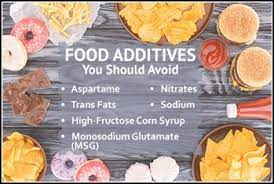Why Food Additives Are Best Avoided
2024-01-19
While not all food additives are harmful, there is a growing concern about the potential health risks associated with certain additives, leading some people to choose to avoid them. Here are some reasons why some individuals prefer to limit their intake of food additives:

1. Allergic Reactions: Some individuals may be sensitive or allergic to certain food additives. Allergic reactions can range from mild symptoms, such as hives and itching, to severe reactions like anaphylaxis.
2. Sensitivity and Intolerance: Some people may experience adverse reactions or intolerance to specific additives, leading to symptoms like headaches, gastrointestinal issues, or behavioral changes. Certain additives, such as artificial colors and preservatives, are often cited in this context.
3. Concerns about Long-Term Health Effects: There is ongoing research on the long-term health effects of certain food additives. Some studies suggest potential links between the consumption of certain additives and conditions like hyperactivity in children, although the evidence is not always conclusive.
4. Artificial Colors and Flavors: Artificial colors and flavors are often used to enhance the visual appeal and taste of processed foods. Some individuals choose to avoid these additives due to concerns about their safety and the potential impact on health.
5. Preservatives: While preservatives are added to food to extend shelf life and prevent spoilage, there are concerns about the safety of some synthetic preservatives. Some people opt for fresh, minimally processed foods to avoid these additives.
6. Sodium and Other Additives in Processed Foods: Processed foods often contain high levels of sodium, along with other additives like emulsifiers and stabilizers. Excessive sodium intake is associated with health issues such as hypertension and cardiovascular diseases.
7. Preference for Natural and Whole Foods: Many people choose to avoid food additives as part of a broader preference for natural and whole foods. This includes opting for fresh fruits, vegetables, and unprocessed foods to reduce exposure to additives.
It's important to note that not all food additives are harmful, and some are necessary for food safety and preservation. Regulatory agencies, such as the U.S. Food and Drug Administration (FDA) and the European Food Safety Authority (EFSA), set safety standards for food additives, and those that are approved for use have undergone rigorous testing.
Individuals who choose to avoid food additives often do so based on personal preferences, health concerns, or specific dietary needs. If someone has specific sensitivities or health conditions, they may benefit from consulting with a healthcare professional or nutritionist to determine the best approach for their individual circumstances.


